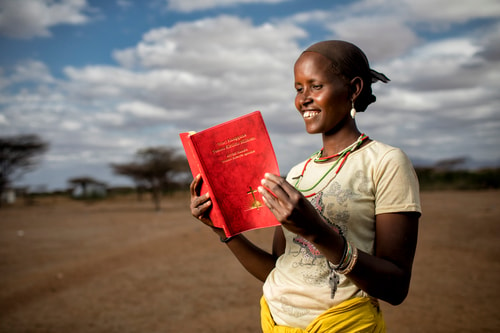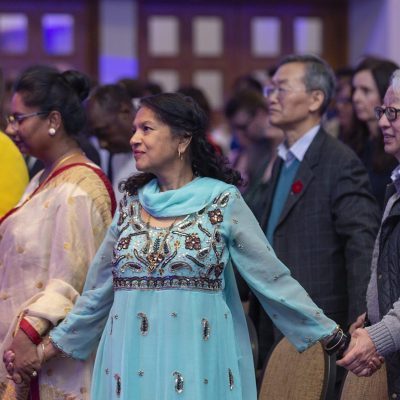“It is for freedom that Christ has set us free. Stand firm, then, and do not let yourselves be burdened again by a yoke of slavery”.
This was the first verse from the Bible that Afaafa* had ever read. As a Kenyan Muslim who had been through madrassa and had been taught Islamic teaching, she had refused even to touch a Bible. She had planned to convert her Christian friends to Islam, but one of them challenged her to read the Bible for herself. She decided to read the first verse she set her eyes on, and there it was, Galatians 5:1. When reading it she felt something powerful come on her. And that night she had a dream where God invited her to choose slavery or freedom. She chose freedom and became a follower of Jesus. Her two sons are growing up knowing Jesus.
Since 2005, Afaafa has been a Bible translator because “if God can change my life through one verse, then I expect every verse I translate will impact the life of another Bydla* person”. She longs to see her people – the Bydla – receive God’s word in their language and know the freedom that comes in Christ. For God’s word has power to change individuals, especially when His word is in the language that speaks to them best. It can bring freedom to communities and cultures too.
Take the Murle people of South Sudan. From a handful of Christians in the 1960s the Murle church has grown: now 30 – 40 per cent of Murle are Christians. “Part of that growth is due to the availability of the Murle New Testament, which was published in 1996,” says Jackie Marshall-Ringer, who serves with Wycliffe Bible Translators and its field partner SIL. “When I spoke recently with Murle church leaders, a recurring comment was, ‘Without the Murle New Testament we wouldn’t be here. Many of us are not learned, and we don’t know English or Arabic well. We wouldn’t have been able to learn more about our faith nor become pastors, teachers, elders or leaders.’’
Church growth is just one impact of having the New Testament in their own language. “Cattle raiding is a normal part of life across many communities in South Sudan,” says Jackie. “Yet Murle Christians no longer go raiding. A full understanding of biblical truths through having their Murle Bible has caused them to break free from ungodly cultural norms.”
Meanwhile, for the Kombio people of Papua New Guinea, deep-seated, false spiritual practices have been uprooted as they have engaged with the scriptures in their own language.
Carrying burdens is part of everyday life for the Kombio. Dirty dishes, laundry, vegetables, water, firewood, even children – all can end up being transported in baskets. But these aren’t the only burdens the Kombio have carried for generations. They have darker, heavier burdens that afflict them daily with fear, worry and demands: ancestral spirits.
To the Kombio, life is a delicate balance between appeasing and pleasing the fickle spirits that live in the forests and rivers. Poor crops, sickness, low school grades – just some of things that Kombio people might attribute to upsetting the spirits. According to scripture, these ancestral spirits are demonic, keeping the Kombio in fear and bondage.
Breaking free from the shackles
Recently, Luke Aubrey and a team involved in scripture engagement ran a Bible course for the Kombio that addresses cultural lies and beliefs. “About 50 Kombio church leaders and villagers participated,” says Luke. “As they studied the Bible, revelation came.” The Kombio church leaders asked: Do you mean these ancestral spirits are from Satan’s kingdom? And that Christ has broken their power by disarming them at the cross? (Colossians 2:15). Did God really say He would never leave nor forsake us? (Hebrews 13:5). Then we don’t have to fear these spirits anymore. We are truly free from their grip! (John 8:36)
One participant commented: “Ancestral worship dominates our belief system. Even though I’ve been a pastor for many years, this belief still imprisons me and my family. I thank God I attended this study. With God’s truth we can now stand firm against these false beliefs.” Sometimes engaging with scripture takes time, even in your own language – particularly when it’s challenging something ingrained in your culture.
The Rendille of Kenya only got their complete New Testament last year. Yet the impact of receiving God’s word in their language predates the dedication of their New Testament. Pastor David Gargule, a Rendille church leader, said: “It was Bible translators who brought community development. They planted churches, set up an emergency response system, and sank boreholes to provide drinking water. But they also empowered the Rendille community by running adult literacy programmes and offering education for children.
“Most Rendille are illiterate and cannot read or write even in Rendille. The education provided through the Bible translation has freed the community from the shackles of illiteracy, to look beyond their limitations and for a brighter future for their children.” The translation of the New Testament in Rendille – in both printed and audio forms – has brought the gospel closer to people’s hearts. On receiving the audio version on her phone, one woman excitedly exclaimed: “God speaks my language!” The translation has made it easier for evangelism, and many Rendille are turning to Christ and away from traditional religion.
But it’s not just spiritual and physical changes. Having the Bible in their language is bringing seismic changes to Rendille culture too. “There is a continuing fight against oppressive traditions,” continues David. “The church is challenging traditions such as female genital mutilation (FGM) and early marriages, by embracing the gospel and a transformative worldview. We’ve rescued many girls from early marriages and FGM and have placed them in Christian schools. We’re giving them a chance for a better life and freedom in Christ from abusive practices.”
There’s been another integral change in the Rendille worldview, too. “Traditionally, Rendille identity has been tied to their animals,” says David, “so they’ve valued camels more than people. The camels would be allowed to drink from the scarce well water before women and children. After receiving the gospel, now the children and women drink before the camels.”
We can do more When you have the Bible – especially in the language that speaks to you best – it brings freedom and affects every aspect of your life and culture. Yet, despite the progress that’s been made in translating the Bible, still 1.5 billion people don’t have access to God’s word in the language that they understand best. That’s one in five people.
“God’s word is powerful,” says James Poole, executive director of Wycliffe Bible Translators. “All over the world lives are changed when people receive the Bible in the language that speaks to them best and discover Jesus and the freedom He has called them to enjoy. That’s why the task of Bible translation is so urgent: God’s word has the power to transform whole communities today.”
“So if the Son sets you free, you will be free indeed!” (John 8:36). That freedom comes most completely when people read God’s word in the language that speaks to them best. That’s the freedom that transforms.
*Names changed for security reasons.
Photo credit: Seed Company and Esther Havens Photography



